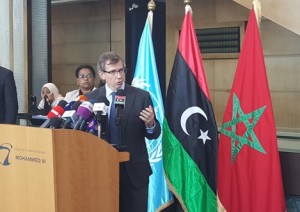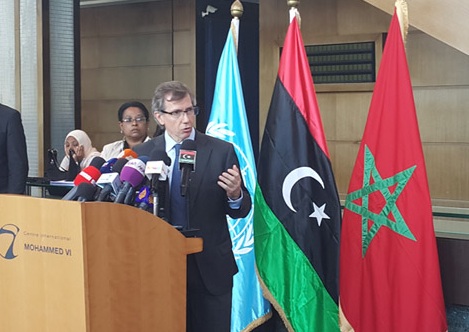By Libya Herald reporters.

Tunis, 19 April 2015:
The latest round of Libya peace talks ended in Morocco this afternoon with UN envoy . . .[restrict]Bernadino Leon insisting “80 percent” of a new National Unity Government has been agreed.
Despite an upsurge of fighting in east Tripoli and Benghazi and the claim by IS to have executed 30 Ethiopian Christians, Leon said a deal to end the war is close.
“I can tell you that we have now a draft which looks like something very close to a final agreement,” Leon told reporters at the talks venue, the Moroccan resort of Skhirat.”Eighty percent of the text in this draft is, let me put it this way, is something that the parties can agree.”
Both sets of delegates are returning to Libya to consult on the draft. They are expected to return in two weeks time, where discussions will focus on the final twenty percent.
In the meantime, Leon says he hopes this week to meet key military leaders, underlining the importance in having combat forces in the agreement.
“This will be the first time the armed groups, the people who are holding weapons and who are fighting on the ground, might meet,” he said. “This is very important because all this work, all these efforts, will not work, will be useless, if we don’t bring completely on board all those who are taking decisions on the ground, who are fighting on the ground.”
Leon, a Spanish diplomat appointed in September to head the United Nations Special Mission to Libya (UNSMIL) declined to give details of the 20 percent still to be agreed.
“Let me keep the discretion of the elements that have to be discussed,” he said. “In general, the remaining points, the ones that require more attention in the coming days are those related to the competences of the different institutions and the separation of powers. Security issues, this is equally important.”
The Leon Plan calls for a new unity government, in which both the internationally recognised parliament, the House of Representatives and the Tripoli-based General National Congress, would share some measure of power.
The HOR is to remain as a legislature, with the GNC also given a role possibly as a high council. In theory, both would combine to appoint a three-strong presidency, a prime minister and a cabinet to run the country until a new constitution is ready, paving the way for fresh elections.
As ever, the sticking points concern the sharing of power between the two sides. The HOR has previously demanded that the split reflect the results of the June elections, which some think would leave GNC as a minority voice. The GNC meanwhile insists the HOR is illegitimate, based on a supreme court ruling last November which declared invalid the law for the June elections.
Like Leon, both sides have made optimistic signals, with GNC delegate Saleh Al-Makhzoum reported by the Libya Observer saying vital progress had been made. HOR members in Tobruk said they looked forward to discussing the draft proposals.
Leon admitted that “not everything is good news”, a reference to fighting that has claimed several lives in Tripoli and to the IS claim to have executed 30 Ethiopian Christians.
But the success will enable him to report progress to the EU foreign ministers meeting on Monday with Libya and its migrant crisis, high on the agenda.
Having declared last week that these current negotiations are the “final” peace talks the UN will convene, Leon said a deal must be cut when both sides return.
“They have to go back to their constituencies and they will come back in the coming days – hopefully not this coming week but the following one,” said Leon. “Our request to them is that this is to finalise the agreement.”
Leon hopes also to include other voices in the process, reaching out to civil rights groups, local councils and tribal elders, seeking a peace deal that is acceptable by all Libyans.On Tuesday there will be a two-day meeting of women’s groups in Tunis and a meeting of tribal elders is still supposed to be happening in Egypt. [/restrict]








